In the morning, I did what I could to practice Magyar with people, including the owner of the Panzion, and it was to prove useful to us over the next few days. On the edge of town, there was a cramped little store where I bought toilet paper. It seemed to be patronized exclusively by the Roma, who were gathered around it with their horse carts, chatting and bargaining, perhaps trading in horses (for some were unhitched, and were being closely examined). I heard some Romani, but they appeared to be mostly conversing in Magyar. Romanian toilet paper comes in hideous pink colour and has the texture of roofing tiles.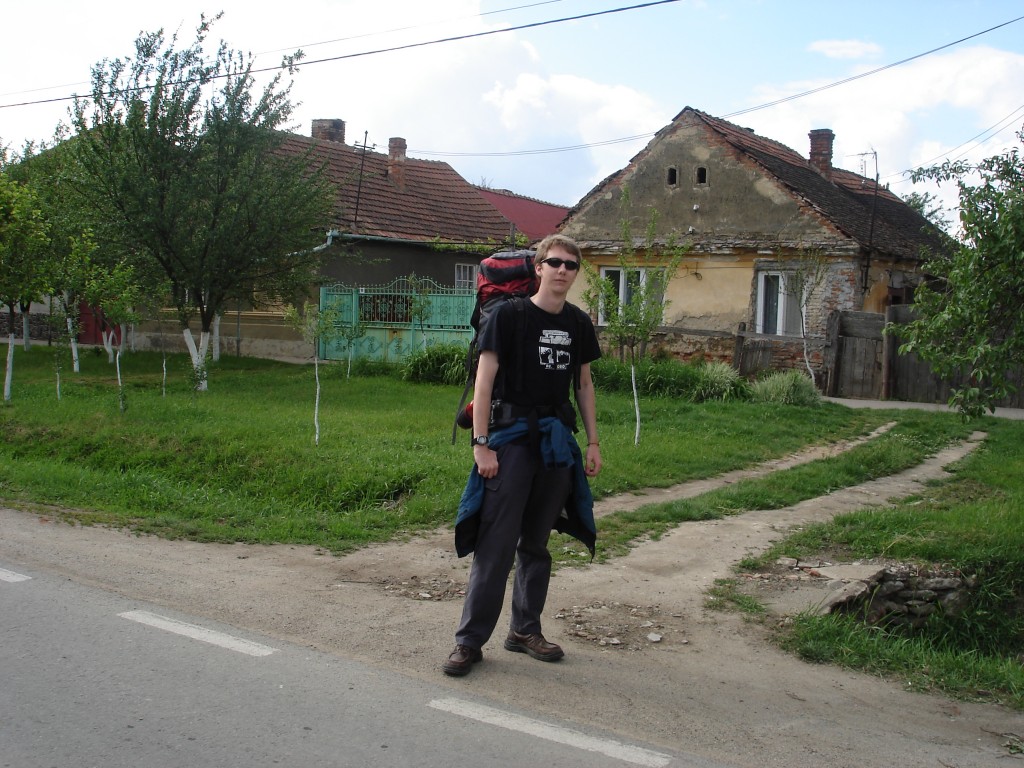
When we felt that our obligations in Valea lui Mihai were completed, we started to hitch-hike again. Our next destination was the ruins of the ancient Dacian capital at Sarmizegetusa. This is rather high in the Southern Carpathian mountains. Between us and this area is a region of rugged, but lower mountains and plateaus, heavily forested.
We got a ride almost immediately, with a young construction worker. He spoke English well, and advised us that the road we were planning to take over the mountains would be very slow hitching. On the map, it might look like an important route, but in reality it’s poorly maintained and little used. It would be better to go by train, which would be very cheap, and more efficient. So he drove us to a small town where we could get the train, going considerably out of his way to do so, and even stayed to negotiate the ticket for us at the station. We could not have done so ourselves. There was one lone attendant at the station, and, though the town was overwhelmingly Hungarian-speaking, she spoke only Romanian. The tickets were ridiculously cheap. Crossing the mountains by road might have taken us days, so this was the logical course of action. A train across the mountains to Cluj-Napoca, in central Transylvania, then south to a minor station to switch to a westbound train, would let us off in Orăştie, the closest town to the ruins.
Our ride had been pleasant company, and incredibly helpful. Hitch-hiking in Romania seems to be very easy, and the people extremely friendly. We had an hour to kill until the train showed up, so we walked into the town to get a very good meal of schnitzel and beer in a pub. The town showed the greatest extreme between old and new we had yet seen. There was sprinkling of new construction, and some clean new shops on the town square, but most of the town remained grimly run-down. Every tree was painted with whitewash on its trunk, to a hight of a meter above the ground. The purpose of this was not obvious. Our ride had said he didn’t know why it was done.
Ceauşescu’s Communism had been more brutal and exploitative, and created even deeper poverty than the Soviet Bloc version. Signs of this legacy were everywhere, almost two decades after it ended. There were some modest signs of progress, but away from the main square the atmosphere was haunted. The still air of the late afternoon was broken by the perpetual hooting or owls and cawing of crows, in numbers that I’ve never experienced. So every step along the dusty roads felt like a scene in Hitchcock’s The Birds. The railway station was a decayed little ruin. If we hadn’t just bought a ticket there, we would have assumed it was abandoned. The tracks were mostly rusted and overgrown, and the “washroom“ was an overflowing privy inside a concrete structure too foul to remain in for more than a second.
But the train arrived spot on time, and we boarded it. The coaches were worn and creaky, but they had probably been quite comfortable back in Agatha Christie’s day. It was good enough for our purposes, and the view was very entertaining, as we wound through the mountains, often snaking through tight little valleys and going through tunnels. The landscape resembled Appalachia more than anything from a vampire novel.
The train was reasonably full. A man in our compartment spoke English. He was a railway construction engineer, and rather pessimistic about Romania’s political corruption. He was ethnically Romanian, returning from a job in Budapest. The sun went down somewhere in the mountains, and after passing Cluj-Napoca, there was nothing to be seen but darkness. The train didn’t quiet down. Instead, if became alive with chatter, and people leaving their compartments to meet and chat in the gangway. We became caught up in a complex multi-lingual conversation, in which one man was under the mistaken impression that Isaac and I were Germans until we managed to get it straightened out.
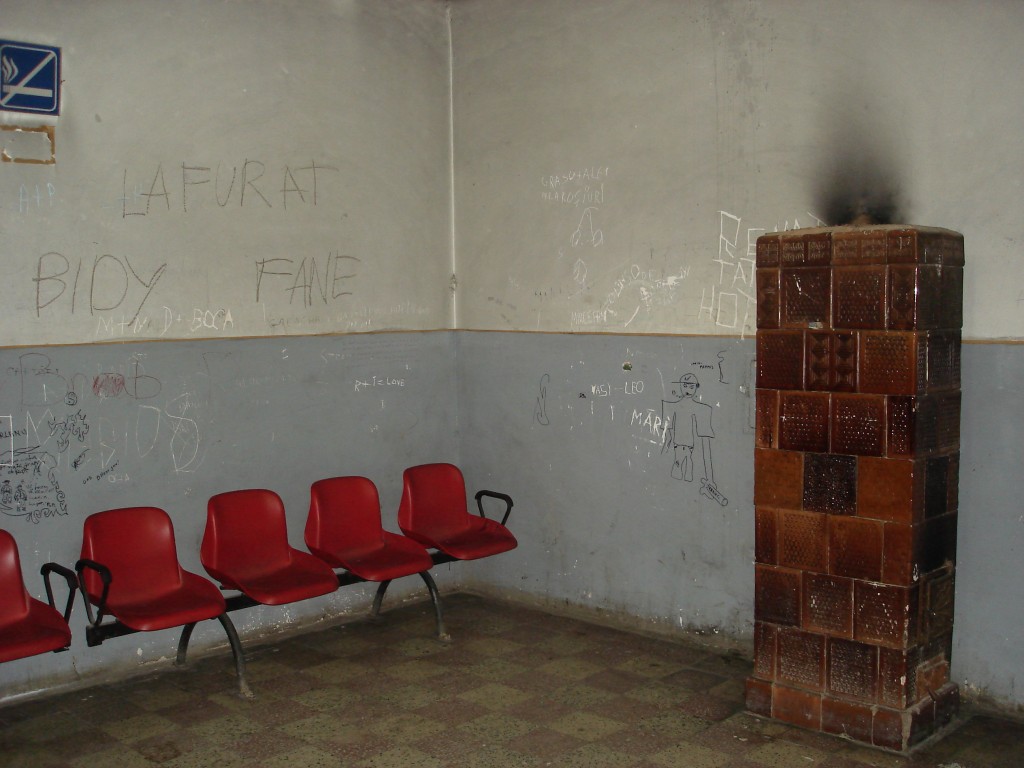 On the second leg, at two in the morning, we were told by one of the passengers that we had arrived at Orăştie. Unfortunately, he was mistaken. We stepped out of the train, it pulled away, and we found ourselves in a minor station about fifteen km east of where we were supposed to get off. A stationmaster came out and told us that the next train would be in an hour and a half. There was a waiting room in the station, one of the grimmest such places I’ve ever been. The crumbling walls were covered by decades of graffiti. There was a traditional tile stove, or Kachelofen, which in the days of Austro-Hungarian Empire was the equivalent of a cast iron Franklin stove. It was not lit, but the night was not particularly cold.
On the second leg, at two in the morning, we were told by one of the passengers that we had arrived at Orăştie. Unfortunately, he was mistaken. We stepped out of the train, it pulled away, and we found ourselves in a minor station about fifteen km east of where we were supposed to get off. A stationmaster came out and told us that the next train would be in an hour and a half. There was a waiting room in the station, one of the grimmest such places I’ve ever been. The crumbling walls were covered by decades of graffiti. There was a traditional tile stove, or Kachelofen, which in the days of Austro-Hungarian Empire was the equivalent of a cast iron Franklin stove. It was not lit, but the night was not particularly cold.
Eventually, the next train came. The station master re-appeared from wherever he was hiding and flagged it down, running to inform the conductor that we should be picked up. One station later, we had disembarked at Orăştie. Our plan was that we would hike through the town to its southern end, then look for someplace where we could pitch a tent. It was very, very, late, and it would not be long before dawn. We trudged through Orăştie, the streets of which were deserted. We got some directions from a gas station attendant, one of the few humans we encountered. The road south towards Sarmizegetusa, unfortunately, began as a string of villages separated by farmland. The villages consisted of an unbroken sequence of houses and walled compounds. Straying anywhere close to one triggered a barking dog. We walked for many kilometers, creating a wave front of barking. Where the villages ended, there was completely flat farmland, newly plowed, coming right up to the road, with only the occasional tree or bush. Absolutely no place to pitch a tent.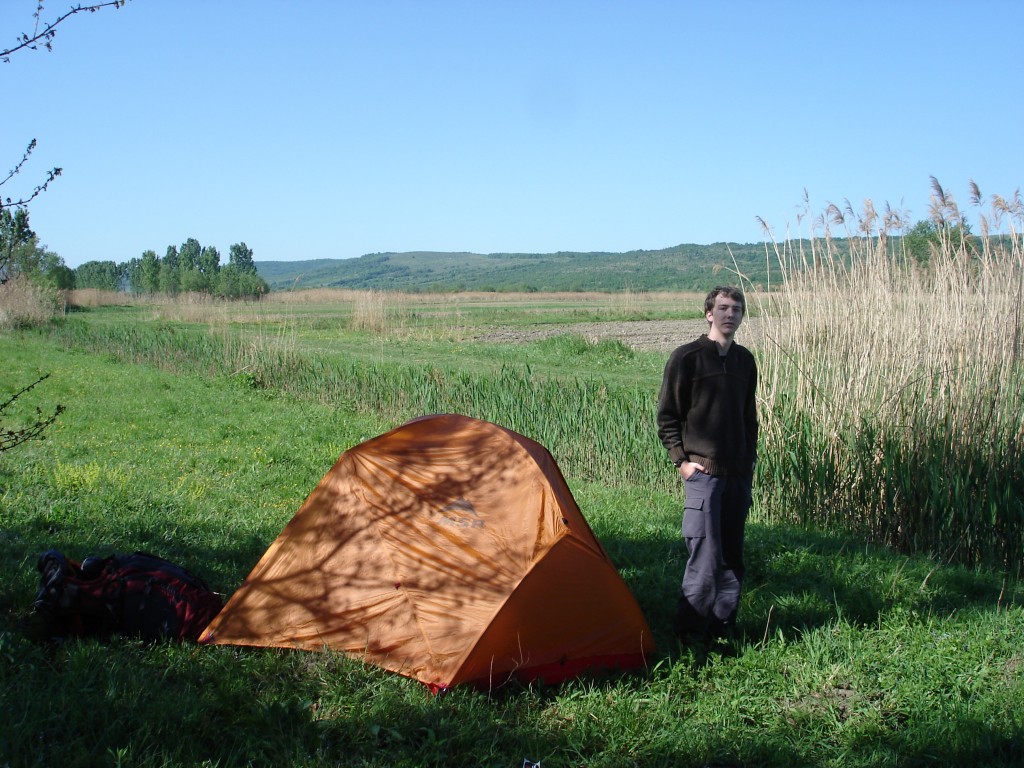
Finally, after many kilometers of tiresome walking, we came to a patch of unploughed meadow that sank away from the road towards a bit of swamp, and had some clusters of trees in it. We picked a spot reasonably far from the road, and pitched the tents. It was well after dawn, by then, but we desperately needed to sleep. This looked like a spot which might not be checked out for awhile.
A few hours later, we were woken abruptly by a pack of dogs, surrounding our tents and baying as if we were foxes brought to ground. We both stayed in our tents, as it seemed a better idea than sticking an arm out of a tent and getting into a struggle with hounds of unknown number, size and disposition. I assumed that someone would soon come to the tents and demand that we justify our presence. But after a couple of minutes, a distant whistle called the dogs off, and they left. After ascertaining that we each were undamaged, we waited for awhile until there wasn’t even any distant barking. Then there was a new sound: the bleating, cloche, and ki-yip-yip of a shepherd driving a flock of sheep. I decided to crawl out of my tent. I was once a shepherd, and I felt I could deal competently with any confrontation with another shepherd. But he moved his flock in a wide berth around us, and treated us as if we were just a lump of rocks. My greeting in Magyar was ignored. We later learned that the entire valley was Romanian-speaking.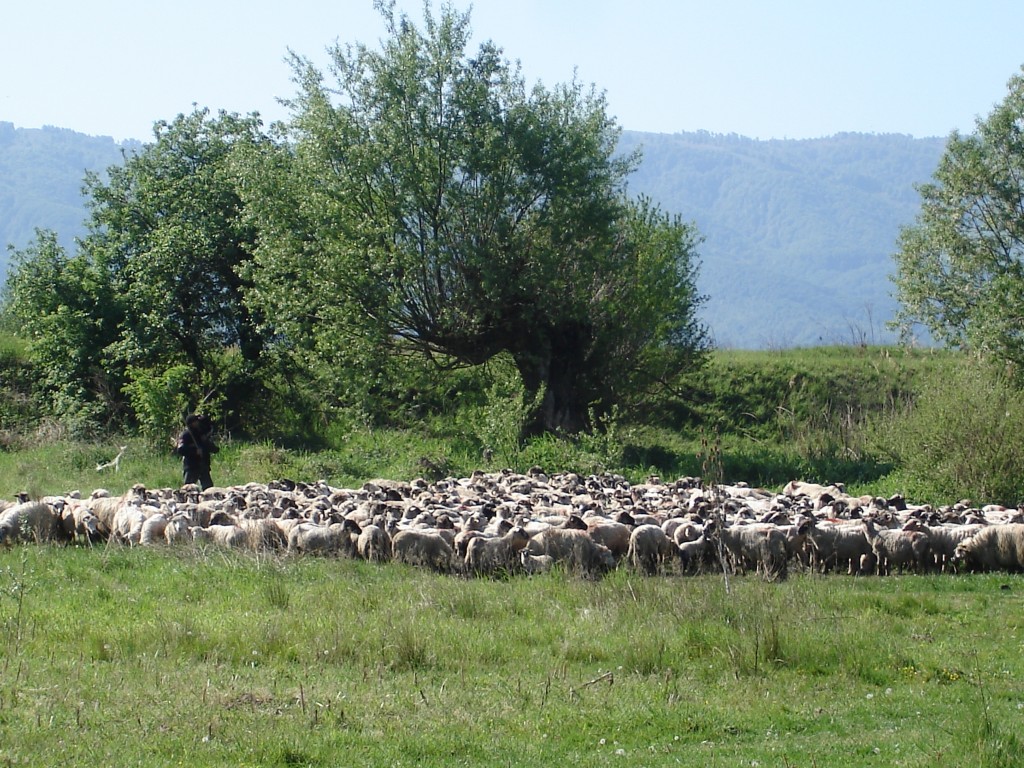
The landscape before us was spectacular. We were still on flat ground, but headed for darkly forested mountains, which surrounded us on three sides, and beyond them, higher and higher ones. The higher ones were covered with snow.
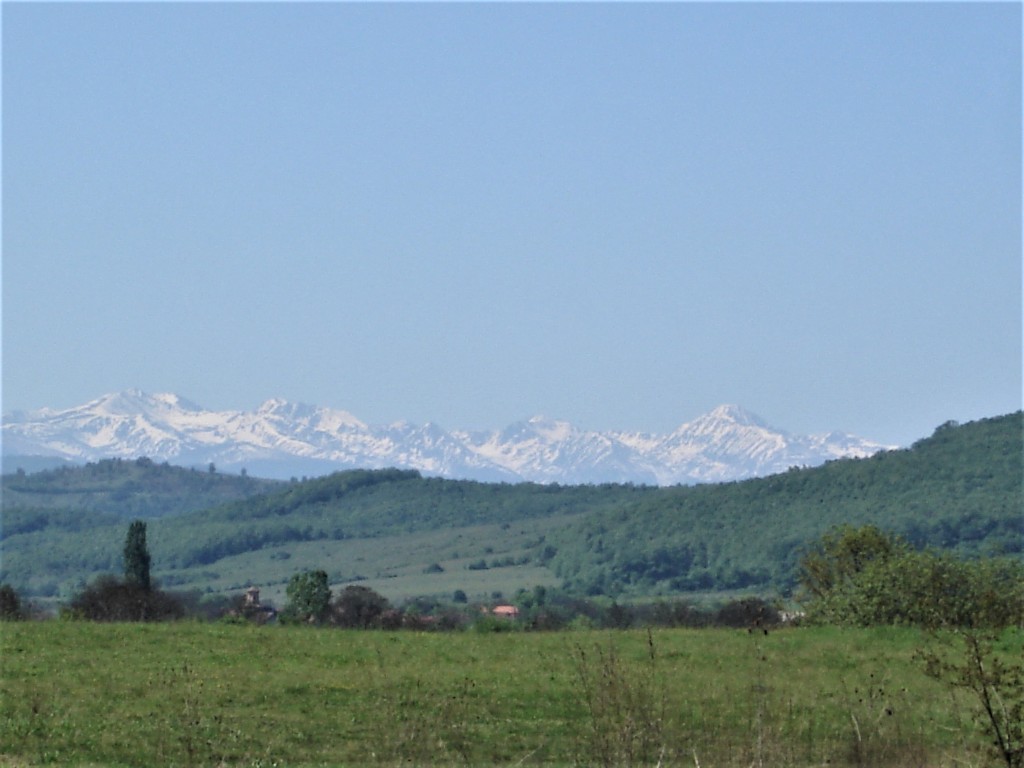
0 Comments.